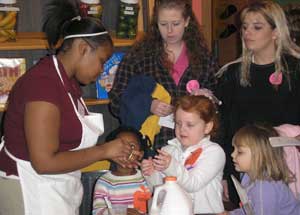Editorial
Front Page - Friday, July 3, 2009
Tyner Science Troupe: the best way to learn is by teaching
Samara Litvack

The purpose of Chattanooga’s Creative Discovery Museum is to provide education through fun, interactive programs and exhibits. Geared toward children 12 years old and younger, the museum strives to stimulate creative spirit and natural curiosity, as well as create excitement for learning through exploration of the arts and scientists.
Open for the summer from 9:30 a.m. until 5:30 p.m., the museum is recognized as one of the premier hands-on children’s museums in the region. And for children who cannot or do not regularly attend the museum, Creative Discovery’s Museum A Go-Go Programs venture into area elementary schools, bringing innovative art and science lessons into the classrooms.
While these programs, too, are geared specifically for elementary school-aged children, some local teenagers in the area have also benefited from the program for quite some time. For years, a group of students from Tyner Academy, a magnet school that focuses on math, science and technology, has been participating in the museum’s outreach program.
The Tyner Science Troupe is made up of about 15 upperclassmen, each of whom help develop, plan and teach science programs to local elementary schools.
As they assist museum staff, these students become knowledgeable and, therefore, comfortable with the material. They pick up specific teaching methods from museum instructors and then adapt them to form their own.
In addition to their participation in outreach, the troupe develops its own lessons to teach in elementary schools located close to Tyner. They research and write the programs, and use the techniques they’ve learned from museum staff to teach elementary school students about art and science in new ways.
“They’ve planned lessons throughout,” says Lynne Mulligan, program manager of Creative Discovery Museum. “They’ve come up with their own lessons to teach to those elementary kids.”
And thirdly, the troupe also works together on an end of the year project. In the 2008-2009 school year, for example, they participated in a Creative Discovery program called Family Night, in which staff members go to a school and set up scientific exhibits throughout, explaining to elementary students and their parents the ins and outs of each.
“We have nine different classrooms set up with activities and the Tyner students divided up and kind of monitored the different activities,” says Mulligan. “They would talk to the parents and children when they came in the room about their different activity.”
One such activity allowed children to think and act as scientists. Using different materials, such as wood, rubber bands, paper and wheels, their challenge was to create vehicles that would move. The Tyner students brainstormed earlier that day to see what worked and what didn’t, and were able to take their knowledge and guide the younger students through it at Family Night.
“They just had so much fun,” Mulligan says. “It was really neat watching the high school kids playing with that kind of stuff and seeing what they came up with, and trying something and then it didn’t work, and then trying something else. And then watching them later that night take the cars they had made and use those and really be role models for the kids, talking them through: ‘OK, that didn’t work. Let’s try this.’”
Another biofuels exhibit that night was home to an array of activities regarding alternative energy. There, kids and parents alike learned about new and possible energy sources, under the instruction of some well-educated troupe members.
“I think that’s one of the coolest things I did with them was going from working with them during the daytime to working with them at night,” says Mulligan. “I think Tyner students learned a lot throughout the year, organizing and planning lessons, stuff with public speaking, talking in front of the group. They certainly increased their knowledge about science and were able to impart that kind of knowledge to the little kids and to our guests here at the
museum.”
Through a total of nine different classrooms set up with activities, troupe members spoke knowledgeably and confidently to students, parents and their peers. And, in addition to sharing the knowledge they’d gained, the Tyner students took a lot from the experience themselves.
The skills they attained through inventive thinking, strategizing, implementation and public speaking will be hugely beneficial in college and in the workforce.
It has been said that to teach something, one must fully understand it. Not only could the Tyner students successfully teach their material, they were excited to do so.
“I had a great time working with them, just seeing their growth and their influence on the other kids,” says Mulligan.
“It’s been a real positive experience for us as a museum and for the school, for the Tyner students. We’re looking forward to working with them again next year.”
|
|